Liam Payne: Foundational, Then Expendable
One Direction Deep Dive #1
Welcome to Fandom Exile, your destination for anti-nostalgia fandom research and cultural criticism.
This marks the beginning of my One Direction Deep Dive, starting with Liam Payne on the anniversary of his passing. Thank you for reading.
One Direction wouldn’t exist without Liam Payne, and I mean that literally.
The band was built around him.
In a 2022 podcast appearance, Payne said that Cowell told him he had been the foundation the band was built around, and this led to a barrage of abuse and mockery from harries, Harry Styles fans, who felt he was speaking out of turn and making himself more important and trying to rewrite the past.
But Payne was correct, and anyone who followed the band from the start knows this. Payne was the lead vocalist, the one with the most skill and experience from the start. Watching a performance of theirs from the X Factor era makes this abundantly clear, and he overwhelmingly carried the performances.
Payne first auditioned for The X Factor in 2008, at the age of 14. He made it through bootcamp and to the judge’s houses, at which point it was determined that he was too young, and he was advised to return in two years.
That’s what he did. He spent those years honing his craft, performing in pubs and clubs in the UK. When he returned to The X Factor in 2010, now aged 16, Cowell deemed him ready. Part of the unseen audition footage has Cowell singing his praises, “The confidence, the swagger, the charisma, the believability, the voice, the way you look: absolutely on the money.”
I don’t think there’s any doubt that out of the five of them, Payne was the most likely to pull through as a soloist. But in a move exemplifying the loss of autonomy when you sign on for these shows, he was put in a group, instead, tasked with anchoring four other boys.
Having been on the show previously also made him a great hook for publicity: he was familiar to audiences that followed the show and served as a returning contestant done good. He wasn’t the oldest, but by virtue of being the most experienced, the most dependable, he became the frontman, the focal point.
He had the most stage experience and the strongest vocals. Watch back any X Factor performance, it’s starkly clear which one of them actually belonged on that stage. He was the lead vocalist on the show, and the first verse guy for the longest time. On the first three albums, he clocks in at 38 first verses, because he could be relied on to set the pace and the tone for live performances. Zayn Malik’s vocals are the only that could challenge Payne’s, but he was not keen on performing, nor experienced enough to really stand out. When he left the band in the middle of the tour, Payne took over the vast majority of his vocals for their remaining performances because he was the only one that could. Even though Styles’ vocal parts were increased massively in the last two albums to grease the wheels for his solo takeover, Payne’s solos increased by nearly 15% in the last album, likely taking over those intended for Malik.
Early on in their career, he was also visually interchangeable from Styles—something that is notable in comment sections on their early videos. This only lasted until the decision was made to push Styles to the front. A young, carefree lad makes for easier tabloid fodder over the responsible try-hard. As early as 2011—before their debut album even came out— The Sunday Times referred to Payne as “the poor man’s Harry,” a bizarre statement to make not only considering the history of the band, Payne’s clear lead singer position, his experience, and his future contributions. Styles wasn’t an artist, he was a character.
Payne’s experience and maturity landed him the role as “the responsible one” and he became known as “Daddy Direction” early on, and he performed this part for the rest of the band’s run. He told The Guardian in 2019 about being called by management to get the boys to stop misbehaving. He was held accountable for their mischievous turns when he never asked for it, and what did he get for it, ultimately? The weight of this role took its toll, and by the end of the band’s run, he was getting wasted just to get on stage.
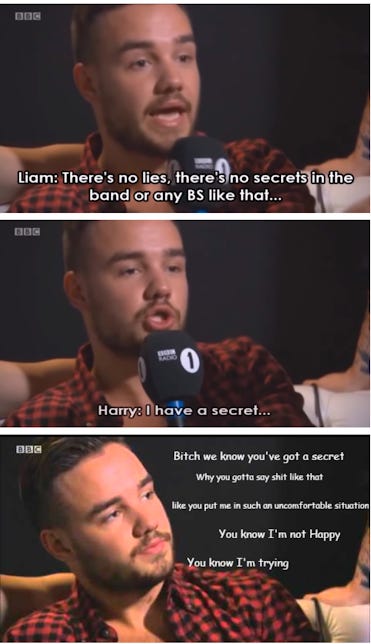
He would corral the boys and toe the company line, tasked with delivering the talking points and staying on message. He was the mouthpiece for the band for the outside world. As early as when they lost X Factor, Payne was the one who stepped up to the plate to do the after-camera interview while the others were breaking down. He told Wonderland magazine, “I just left them because I wanted them to have their moment and the cameras didn’t need to see them like that.”
“When something was going wrong, I’d get a phone call. If there was an apology needed, it was me. I was the spokesperson for the band, as it were, with the press and the label.”
The Telegraph, September 22, 2017
He could be counted on, but that also meant he could be blamed. He wasn’t fun and carefree, he had worked hard to be in this position. And trying hard isn’t cool. He was a laughingstock, a scapegoat. This carried over into their solo careers because his early success with “Strip That Down” complicated the narrative. He ran laps around the others, breaking audience attendance records for his first solo headlining performance. But he didn’t have a support structure to help build him up, instead it was extractive: chasing streams and quick hits. It was about milking it for what it was worth, while it was hot. Without that scaffolding, he fell out of favour from the industry pretty fast.
Posthumous tributes from Zayn Malik and Louis Tomlinson emphasized his importance to the band. Directing his words to Payne directly, Malik said, “You were the most qualified in every sense,” and pointed out that when they met, “you were already a professional.”
Tomlinson said, “Liam was in my opinion the most vital part of One Direction. His experience from a young age, his perfect pitch, his stage presence, his gift for writing.”
In a recent interview with Rolling Stone UK, Tomlinson elaborated on Payne’s importance to the group:
“We were all just so amateur, but he was already where he needed to be by the time he did his first [X Factor] audition. None of us would have admitted it at the time, because you have a lot of pride as a young lad, but we all looked up to him like that.”
Footage of the band being put together was only made public in 2022, just two months after Payne’s controversial podcast appearance. But the fans had moved on, and the damage had been done. Payne had retreated because of the response he’d received, sufficiently chastised.
In a video he posted a year later, he stated that “thick skin is a myth” but he also seemed grateful for the fallout from the podcast, stating it was “probably one of those life-changing moment that saved my life” and allowed him to “actually arrive where I am today,” which was sobriety. At least for the time being.
Perhaps if that had been the only time he’d been harassed and hated on, it would’ve slid off his back. But it wasn’t. It had been a constant, for years.
After his death, many people claimed that the ongoing harassment he received was due to the abuse allegations that his ex-girlfriend levied at him in 2024, but that’s rewriting the past, a convenient excuse to justify the severe mistreatment he received for years, based on vibes rather than actionable offenses.
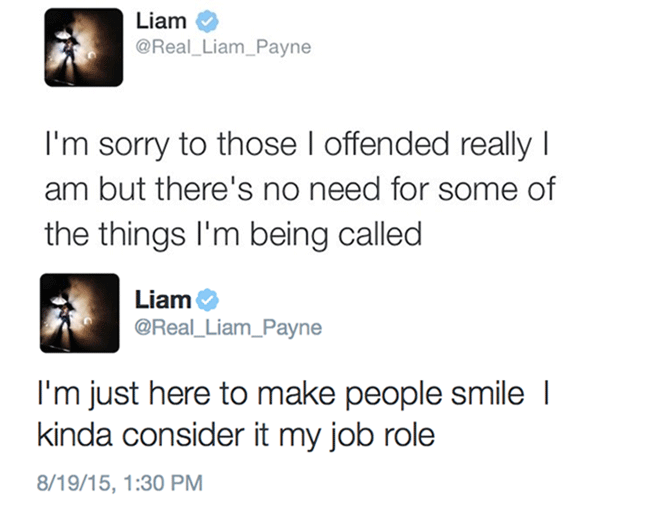
In 2017, while appearing on the Big Top 40 he was asked who of the 1D men he’d ask to babysit his son, he went through the options and joked that if he left his baby with Styles, he would probably be returned in an outfit Payne wouldn’t understand. This led to him being accused of homophobia.
In 2023, he attended the London premiere of Tomlinson’s documentary, All of those Voices and posted about it on Instagram. It was a long, thoughtful caption, where he expressed regret for not being there for him, “I have time now and I’m me again so will try to make amends.” The post only stayed up for two days because he was inundated with comments about how he was bandwagoning and trying to steal the spotlight from Tomlinson.
In other words: he could do nothing right. A bit of banter was framed as abuse. Support was framed as leeching. When he performed shirtless, he was a pathetic Justin Bieber wannabe. When he tweeted about a TV show he liked, it resulted in DMs lecturing him, telling him it made him a bad person, and he should, “be more like Harry.” Dancing while attending Niall Horan’s concert was attention whoring. Whatever he did, he was considered in the wrong. His dependable persona didn’t work in his favour, but when he started opening up and being vulnerable, discussing substance abuse, these disclosures were weaponized against him.
Even in death, he is still the butt of the joke for many. When I say that harries are the most toxic group of fans I’ve ever encountered, it’s because of things like these:
Payne was open about his struggles, about how grateful he was to have survived for so long. In 2021, on the show Straight Talking with Ant Middleton, he expressed that he felt “lucky to be here, still.” The constant online hounding had gotten to him, repeatedly, and he just wanted it to end. When he appeared on Steven Bartlett’s Diary of a CEO, he said he didn’t know if he’d hit rock bottom yet.
He alternately struggled with agoraphobia and claustrophobia: recalling being locked in hotel rooms in the band days and going mad, resorting to emptying the minibar. It was how his drinking problem started, and having to portray the sensible, responsible one exacerbated the problem. He frequently recalled the suffocation it came with, symbolizing his struggles. And how did it all end? With him locked in a hotel room, alone in a foreign land, trying to escape the only way he could.
And all he wanted was to entertain and perform. He expressed sadness that they never got to tour their last album, the one that he was the most proud of.


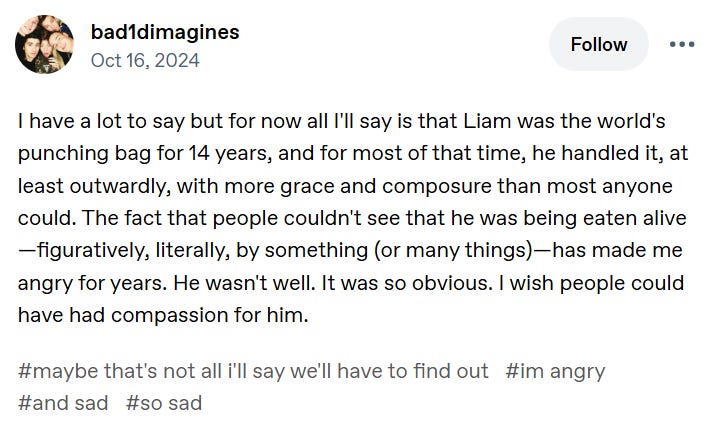
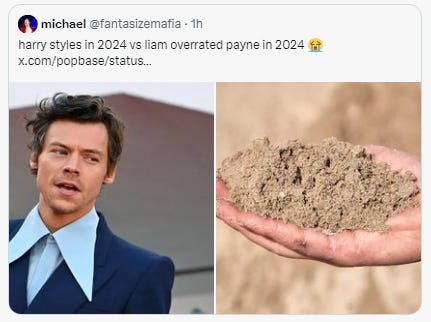
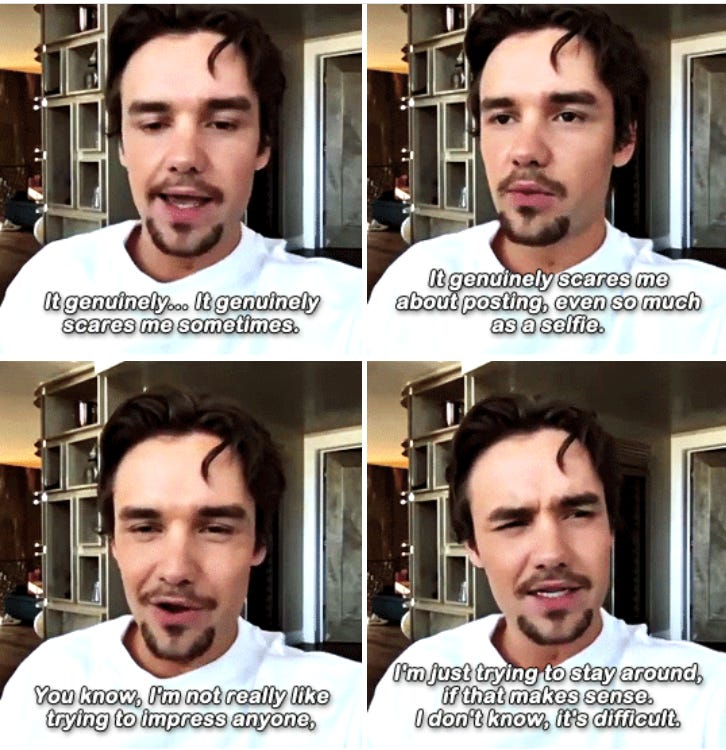
Ah Liam...
This is genuinely fascinating, I knew almost none of it. Are you gonna do each member in turn?